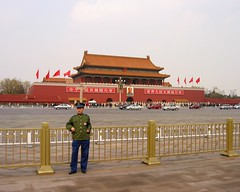A professor from Australia’s Monash University has a piece in the Sunday edition of Taipei Times that confirms what I’d always suspected about Taiwan’s ostracization from the international community. Namely, that it was all Chiang Kai Shek’s fault.
Chiang lost the ROC its UN seat
n mid-1971, the US and other countries began to push for a “dual representation” solution. The Australian ambassador to Taipei, Hugh Dunn, wrote on June 4, 1971, to then Minister of Foreign Affairs Chow Shu-kai (周書楷): “What we would see as a desirable finish is that the People’s Republic take over the Security Council seat, and that Taiwan remains on as a member, an ordinary member, of the UN … If the UN recognizes the PRC instead of the ROC as occupying the Chinese seat, and nothing else is done, Taiwan would be out in the cold. We wouldn’t favor that resolution.”
Chow showed some willingness to adjust to the new situation. When talking to the Japanese ambassador to Taipei, he said: “Although I have no way to approve of it and under the circumstances must express my opposition, we could tolerate its existence.” The English phrase, “We can live with it,” is added to the Chinese text.
In an “absolutely secret” secret document dated Aug. 3, 1971, the ministry laid out the options and Taiwan’s preferences. The first preference was that the “important question” motion be passed, which meant that the PRC would require a two-thirds vote to be admitted. The second preference was “dual recognition.” But even at this late moment, after more than 20 years of rejecting any alternative to “one China,” the Nationalist authorities would not openly embrace dual recognition.
So back in 1971 the USA, France, Japan, Australia, New Zealand and possibly other countries were all ready to support a motion granting the Republic of China (aka Taiwan) independent membership in the UN simultaneous with the recognition of the People’s Republic of China (aka Red China/Mainland China) as the holders of the Security Council seat. From today’s perspective, at a time in which the PRC’s economic, political, and military power is rising fast it we forget how powerless they really were back then – isolated internationally far more than Taiwan is today, their economy and social structure devastated by the Cultural Revolution. Had the ROC/Taiwan government actually put its support behind a two nation, dual representation structure at that time, China would have had absolutely no chance of opposing them, and the absurd fiction of the ‘one China policy’ would have never gotten off the ground.



